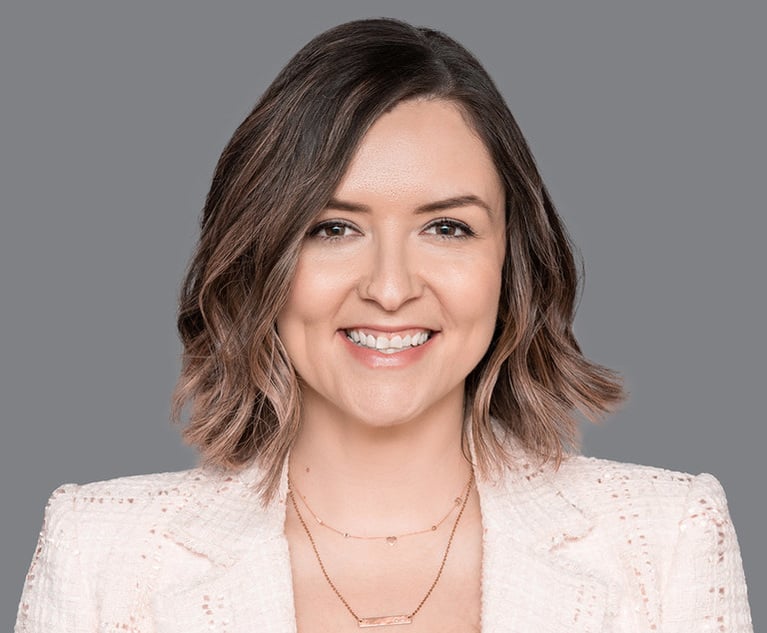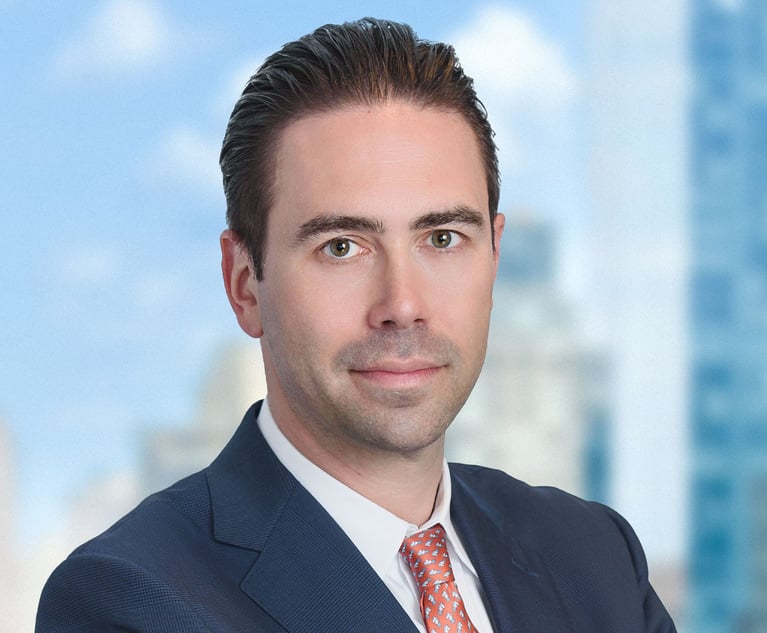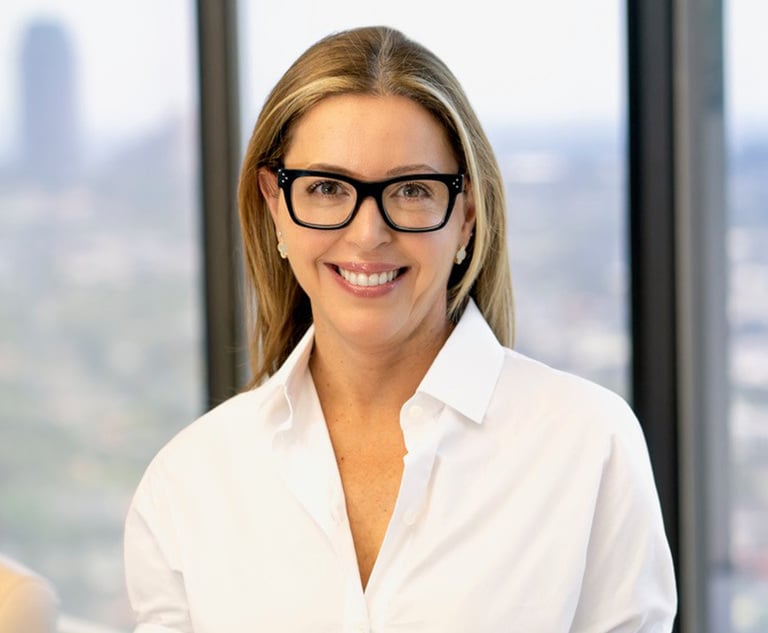Litigator of the Week: Chris Morvillo Makes New FCPA Law (and Wins One for Dad)
Clifford Chance partner Christopher Morvillo won a precedent-setting ruling from the Second Circuit with major implications for FCPA prosecutions.
August 31, 2018 at 12:05 PM
10 minute read
The original version of this story was published on Litigation Daily
Our Litigator of the Week is Clifford Chance partner Christopher Morvillo, won a huge ruling from the U.S. Court of Appeals for the Second Circuit in a case of first impression involving the Foreign Corrupt Practices Act.
It was one of those decisions that prompted multiple law firms to send client alerts. Wilmer Cutler Pickering Hale and Dorr in its alert, for example, nicely summed up why the decision is so important: The court “dealt a significant setback to prosecutors seeking expansive theories on which to build an FCPA case against non-U.S. companies and individuals.”
In a Q&A with Lit Daily, Morvillo talks about the case.
 Christopher Morvillo, of Clifford Chance
Christopher Morvillo, of Clifford ChanceLit Daily: Tell us about your client and the general scheme alleged by the government.
Christopher Morvillo: Lawrence Hoskins is a retired British citizen who lives with his wife outside of London. Between 2001 and 2004, he worked in Paris at the headquarters of Alstom S.A., a French multinational engineering company. In 2014, 10 years after he left Alstom, he was arrested on these charges, which in essence allege that he approved payments to a third-party agent knowing that person would use some of the money to bribe Indonesian government officials to secure a contract to construct a power plant. Mr. Hoskins pleaded not guilty and denies these allegations.
What are the specific charges in the indictment?
The current indictment charges Mr. Hoskins with violations of the Foreign Corrupt Practice Act and money-laundering.
Given that the case is still in a pre-trial posture, I know you're limited in what you can discuss, but can you describe what happened in U.S. District Court in Connecticut that gave rise to the appeal?
Sure. This is all a matter of public record, and I am happy to summarize it for you. Essentially, the district court ruled that if a person (or entity) is not subject to direct liability under the FCPA, the government can't charge them with conspiracy to violate the FCPA or aiding and abetting an FCPA violation.
To give you some context here, the FCPA expressly covers a wide array of people and entities. It does not, however, expressly cover non-resident foreign nationals who do not engage in relevant conduct while present in the U.S. and who are also not officers, directors, employees, agents or shareholders of either an American entity or a U.S. issuer.
The government alleged that Mr. Hoskins was an agent of Alstom's U.S. subsidiary, and that he was therefore directly liable under the plain language of the FCPA. We challenged that agency allegation, and a dispute ultimately arose in the district court over whether proof of Mr. Hoskins' alleged agency to the U.S. subsidiary was necessary for the government to prevail at trial on its conspiracy and aiding and abetting theories of liability.
Judge [Janet] Arterton ruled that the government could not pursue such accessorial theories of liability absent proof of Mr. Hoskins' agency to the U.S. subsidiary. Specifically, the district court found that the text, structure and legislative history of the FCPA made it clear that Congress affirmatively chose to exclude certain classes of actors from the reach of the FCPA.
Given that deliberate exclusion, Judge Arterton held that it would improperly circumvent Congressional intent if such persons could be reached simply by resort to accessorial theories of liability. The district court's rationale was based on a Supreme Court case, Gebardi v. United States, and other relevant precedent interpreting Gebardi.
So, what did this ruling mean for the government's conspiracy and aiding and abetting theories?
While they could still pursue those theories of liability at trial, the government would also be required to prove that Mr. Hoskins was an agent of Alstom's U.S. subsidiary. Rather than proceed to trial with that limitation, the government elected to take an interlocutory appeal to the Second Circuit.
What happened in the Second Circuit?
Argument was held in March 2017, and last week the Second Circuit issued a 73-page opinion, which largely affirmed the district court's ruling.
Judge [Rosemary] Pooler writing for the panel (which also included Chief Judge [Robert] Katzmann and Judge [Gerald] Lynch) framed the issue as follows: “whether the government may employ theories of conspiracy or complicity to charge a defendant with violating the Foreign Corrupt Practices Act ('FCPA'), even if he is not in the category of persons directly covered by the statute.”
The court concluded that the answer to the question was no. Closely tracking the rationale of the district court, the Second Circuit engaged in an exhaustive analysis of the legislative history of the FCPA and Gebardi and its progeny.
In addition, the Second Circuit held that its result was supported by the presumption against extraterritoriality. Specifically, the Second Circuit held that, because Congress limited the extraterritorial reach of the FCPA (as noted), reaching such actors through accessorial charges would violate the presumption.
The Second Circuit also reversed an aspect of the district court's ruling relating to the second object of the charged conspiracy, holding that the government could proceed on that object (which the district court had dismissed) so long as the government proved that Mr. Hoskins was an agent of Alstom's U.S. subsidiary.
What was the thrust of Judge Lynch's concurring opinion?
Judge Lynch was not entirely persuaded that the Gebardi rule should extend as far as the panel's principal opinion (and district court's opinion) takes it, but he ultimately agreed that given the clear lines that Congress drew in crafting the statute, as reflected in the legislative history, and the presumption against extraterritoriality, the result was correct. Judge Lynch observed that Congress might want to revisit the FCPA with this case in mind.
On interlocutory appeal to the Second Circuit, the case attracted an amicus brief. Who filed it, and what arguments did it advance?
Yes, the New York Council of Defense Lawyers (represented by Ira Feinberg of Hogan Lovells and Jonathan Bach of Cooley) filed an amicus brief in support of Mr. Hoskins. Their brief focused on a variety of issues, including the presumption against extraterritoriality. In a very unusual development in my experience, shortly before the argument, the panel invited Mr. Feinberg to appear at oral argument and argue the amicus brief.
Oral argument was more than a year ago. What stands out in your memory from the panel's questions?
Yes, 18 months to be exact, but who's counting? I still have the bruises from some of Judge Lynch's sharp questions and hypotheticals. It was a very hot bench, and the argument went well over the allotted time. It was clear from the very outset of the argument that the panel was interested in the issues presented and extremely well-prepared.
What is the current posture of the case?
We are midstream at the moment. The case now will head back to the district court for further proceedings, unless the government seeks to pursue its appellate options further. They still have a few weeks to decide on that issue.
Beyond the application to your client, what do you see as the implications of the decision more broadly?
I think there are several takeaways for practitioners in this area. Given the dearth of caselaw interpreting the FCPA, and the depth of the court's analysis of the issue, the relevant cases, the legislative history and the extraterritorial impacts, this decision is notable. That said:
–The ruling only benefits non-resident foreign nationals and non-issuer foreign entities;
–It will not affect the DOJ's ability to investigate cases with an aim towards determining whether individuals and entities fit directly into one the FCPA's categories;
–The decision is only binding on the DOJ for cases in the Second Circuit, so it's possible that the government will continue to broadly apply the FCPA in other federal circuits;
–The DOJ has other weapons to prosecute conduct that would otherwise violate the FCPA, including money laundering and wire and securities fraud;
–While most foreign companies with significant business ties to the US will continue to seek to adopt a cooperative posture with the DOJ, for foreign entities and foreign nationals with little US exposure, the decision could provide leverage in responding to the DOJ;
–The decision could also cause the DOJ to cede primacy to foreign regulators in certain instances where this decision creates a hurdle to prosecution in the U.S.
Has litigating the case been a team effort?
Oh wow! Yes, very much so. I have been truly blessed on this case to have been able to stand on the shoulders of some of the best lawyers I have ever worked with, each of whom provided invaluable assistance in shaping this case and leading us to this outcome.
My partner Dan Silver and senior associate Ben Peacock were instrumental in helping shape the strategy and craft the arguments on the appeal, along with vital contributions of junior associates Rochelle Swartz and Ivana Djak. There was also a lot of litigation on this issue in the district court, and special mention needs to be made of two of our former colleagues, David Raskin and Alejandra de Urioste, without whose supreme efforts this result would not have been possible.
You come from a family of prominent lawyers—two of your brothers, Scott and Greg, and your uncle Rich, are all partners at Orrick, and your brother Rob is in-house counsel at Diebold Nixdorf. In your father Robert Morvillo's 2011 obituary, The New York Times said he “pioneered the practice of white-collar criminal defense.” What are some of the lessons you've learned from your family about the practice of law?
Well … how much time do you have? I could literally write a book on this question. I was fortunate enough to spend six years of my career working side-by-side with my father and three brothers in the same firm, Morvillo, Abramowitz. I learned more during those years than at any other point in my career, largely from just watching my father skillfully navigate clients through some of the most complex challenges that this job can throw at you. He was the best mentor I've ever had. If I am allowed to dedicate this honor to anyone, it would be him. Hands down.
For starters, I learned along the way that without my indefatigable mother, my amazing wife and two incredible daughters I am lost.
While working with family certainly has its challenges (I mean, do you know my brothers?), one big takeaway for me is that your chances of success improve when you work with people whom you admire, implicitly trust and can comfortably fail in front of; in a “family dynamic,” it's easier to check your ego at the door, roll up your sleeves and collaborate.
In building a practice and mentoring young lawyers at Clifford Chance, I encourage dissent, disagreement and debate to make sure everyone in the room has a voice. Our clients are always better for it.
This content has been archived. It is available through our partners, LexisNexis® and Bloomberg Law.
To view this content, please continue to their sites.
Not a Lexis Subscriber?
Subscribe Now
Not a Bloomberg Law Subscriber?
Subscribe Now
NOT FOR REPRINT
© 2025 ALM Global, LLC, All Rights Reserved. Request academic re-use from www.copyright.com. All other uses, submit a request to [email protected]. For more information visit Asset & Logo Licensing.
You Might Like
View All
Quiet Retirement Meets Resounding Win: Quinn Emanuel Name Partner Kathleen Sullivan's Vimeo Victory

How I Made Partner: 'Your Coworkers Are One of the Most Valuable Assets You Have,' Says Laurel Roglen of Ballard Spahr

Can a Law Firm Institutionalize Its Culture? Boies Schiller’s New Chairman Will Try
Trending Stories
Who Got The Work
J. Brugh Lower of Gibbons has entered an appearance for industrial equipment supplier Devco Corporation in a pending trademark infringement lawsuit. The suit, accusing the defendant of selling knock-off Graco products, was filed Dec. 18 in New Jersey District Court by Rivkin Radler on behalf of Graco Inc. and Graco Minnesota. The case, assigned to U.S. District Judge Zahid N. Quraishi, is 3:24-cv-11294, Graco Inc. et al v. Devco Corporation.
Who Got The Work
Rebecca Maller-Stein and Kent A. Yalowitz of Arnold & Porter Kaye Scholer have entered their appearances for Hanaco Venture Capital and its executives, Lior Prosor and David Frankel, in a pending securities lawsuit. The action, filed on Dec. 24 in New York Southern District Court by Zell, Aron & Co. on behalf of Goldeneye Advisors, accuses the defendants of negligently and fraudulently managing the plaintiff's $1 million investment. The case, assigned to U.S. District Judge Vernon S. Broderick, is 1:24-cv-09918, Goldeneye Advisors, LLC v. Hanaco Venture Capital, Ltd. et al.
Who Got The Work
Attorneys from A&O Shearman has stepped in as defense counsel for Toronto-Dominion Bank and other defendants in a pending securities class action. The suit, filed Dec. 11 in New York Southern District Court by Bleichmar Fonti & Auld, accuses the defendants of concealing the bank's 'pervasive' deficiencies in regards to its compliance with the Bank Secrecy Act and the quality of its anti-money laundering controls. The case, assigned to U.S. District Judge Arun Subramanian, is 1:24-cv-09445, Gonzalez v. The Toronto-Dominion Bank et al.
Who Got The Work
Crown Castle International, a Pennsylvania company providing shared communications infrastructure, has turned to Luke D. Wolf of Gordon Rees Scully Mansukhani to fend off a pending breach-of-contract lawsuit. The court action, filed Nov. 25 in Michigan Eastern District Court by Hooper Hathaway PC on behalf of The Town Residences LLC, accuses Crown Castle of failing to transfer approximately $30,000 in utility payments from T-Mobile in breach of a roof-top lease and assignment agreement. The case, assigned to U.S. District Judge Susan K. Declercq, is 2:24-cv-13131, The Town Residences LLC v. T-Mobile US, Inc. et al.
Who Got The Work
Wilfred P. Coronato and Daniel M. Schwartz of McCarter & English have stepped in as defense counsel to Electrolux Home Products Inc. in a pending product liability lawsuit. The court action, filed Nov. 26 in New York Eastern District Court by Poulos Lopiccolo PC and Nagel Rice LLP on behalf of David Stern, alleges that the defendant's refrigerators’ drawers and shelving repeatedly break and fall apart within months after purchase. The case, assigned to U.S. District Judge Joan M. Azrack, is 2:24-cv-08204, Stern v. Electrolux Home Products, Inc.
Featured Firms
Law Offices of Gary Martin Hays & Associates, P.C.
(470) 294-1674
Law Offices of Mark E. Salomone
(857) 444-6468
Smith & Hassler
(713) 739-1250









